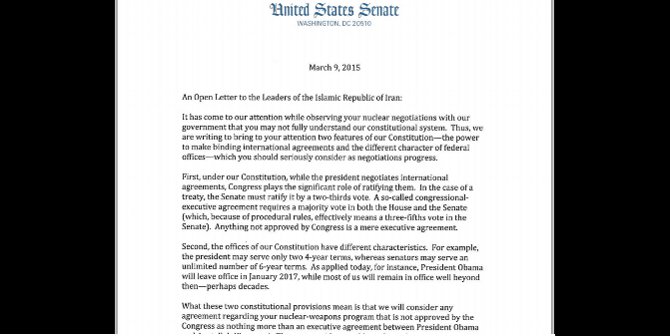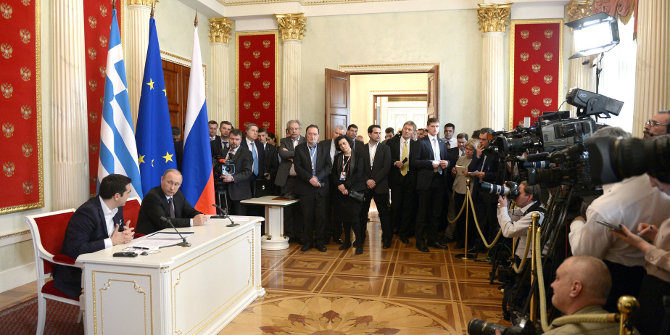 Last week 47 Republican Senators signed an open letter to senior leaders in Iran, which suggested that any deal made over that country’s nuclear program could be changed or undone by a future Congress or President. Richard Brodsky argues that these 47 Senators are rewriting the constitutional, political and historical norms that have, until now, dictated that Presidents conduct foreign policy, while Congress only influences, or occasionally approves it. He writes that the letter is good for President Obama in the long run, as the public are likely to reject the GOP’s tactic, but that in the short term, it is likely to make a deal with Iran even harder.
Last week 47 Republican Senators signed an open letter to senior leaders in Iran, which suggested that any deal made over that country’s nuclear program could be changed or undone by a future Congress or President. Richard Brodsky argues that these 47 Senators are rewriting the constitutional, political and historical norms that have, until now, dictated that Presidents conduct foreign policy, while Congress only influences, or occasionally approves it. He writes that the letter is good for President Obama in the long run, as the public are likely to reject the GOP’s tactic, but that in the short term, it is likely to make a deal with Iran even harder.
The American system divides governmental power and responsibility amongst three independent branches of government. It’s called “Checks and Balances” and it has largely worked. No matter how much reliance we place on legalities to enforce the system, like most things, it depends on internalized acceptance of the rules by public and players alike. That fundamental cultural reality is now under attack.
Presidents conduct foreign policy. Senators don’t. They influence and occasionally approve it. But the distinction is a necessary and important part of the “Checks and Balances”, no matter what your position on an individual controversy.
We need an active, even an oppositional Senate from time to time. I came out of the struggles of the ’60s, civil rights, women’s rights, the environment- and Vietnam. From my point of view we had a President who was profoundly wrong about the Vietnam War and whose policies were dangerous and immoral. Eventually we found allies in the U.S. Senate, notably Charlie Goodell of New York, Mark Hatfield of Oregon, George McGovern of South Dakota, Alan Cranston of California and Harold Hughes of Iowa. Thank goodness for Senators willing to stand up to the President on foreign policy issues.
Comes now Obama and Iran. Should we have a nuclear deal with Iran, and what should it contain? It’s complicated, and it’s important. I tend to agree with Obama on the need to complete negotiations and consider the risks at that point. But there’s every reason for Senators to express reservations and concerns, to challenge the President, and to make their case to the American people.
Instead, we have 47 Republican Senators who have decided to go beyond anything that has come before and open a second, parallel negotiating/diplomatic process with the Islamic leadership of Iran. Say what?

Imagine the fuss if the anti-Vietnam Senators had written to Ho Chi Minh. Jane Fonda still hasn’t recovered from her Hanoi foray, 50 years later. Or if Democratic Senators had gone around George Bush and had written to Saddam in the run-up to the Gulf War. Or if Senators had gone around Ronald Reagan and written to the Sandinistas. Or if Senators had written to Putin and said the sanctions were a mere stroke of a pen that could be reversed. The howls would resound across the Republican Party.
The point is that even if Obama is profoundly wrong about a nuclear deal with Iran, the Senate letter is different and scary. And crazy.
Crazy is the operative word. There are lots of ways to hold Obama’s feet to the fire, to make the case to the American people that there is no acceptable deal with Iran. Instead, the No Deal 47 are rewriting the constitutional, historical and political norms about foreign policy fights. From now on, it’s ok for the Congress to negotiate foreign policy directly with other nations.
This kind of no-holds-barred opposition to Obama is nothing new. Indeed it is the hallmark of Republican policy and politics. Obamacare, debt ceiling, Homeland Security funding, immigration, you name it. The intensity of the personal dislike, the public contempt, the outright hatred has overwhelmed the rules that have governed our political disputes for centuries. He’s not just wrong, he is an illegitimate, Socialist, Muslim, America-hating, non-citizen, usurping tyrant. Nothing is too far out in fighting him. Democracies need self-restraint and the Republicans don’t have any.
They could have made the same arguments in an open letter to the American people. Instead they are in conversation with their mirror-image right-wing counterparts in Tehran. That’s new and dangerous.
These tactics are politically good for Obama in the long run. The American people understand the difference between dissent and checks on executive power on the one hand, and negotiating with a hostile foreign power on the other. They will reject it. In the short run, it will make a deal with Iran harder and future negotiations with any foreign government much more difficult.
The real danger is the damage to our democracy. We should prize the ability of the people and Senators to criticize and lead us when the President is, in their eyes, wrong. That’s the lesson of Vietnam, the League of Nations, South African sanctions, Cuba and Iraq. We endanger that core value when we rewrite the rules for conducting foreign policy.
A version of this article first appeared at the Huffington Post.
Please read our comments policy before commenting.
Note: This article gives the views of the author, and not the position of USApp– American Politics and Policy, nor of the London School of Economics.
Shortened URL for this post: http://bit.ly/1ANQXRy
_________________________________
 Richard Brodsky – Demos & NYU Wagner
Richard Brodsky – Demos & NYU Wagner
Richard Brodsky served 14 terms as a New York State Assemblyman, retiring in 2010. He is currently a Senior Fellow at Demos, a progressive think tank in New York City, and a Senior Fellow at New York University’s Wagner School of Public Administration. His years of public service focused on government reform, environmental protection and economic policy. He is also a lawyer and a journalist. Follow Richard Brodsky on Twitter: www.twitter.com/richardbrodsky.






